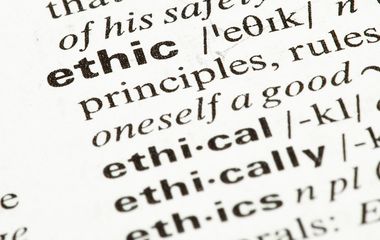
About Us
The Standards Commission is an independent body whose purpose is to encourage high ethical standards in public life through the promotion and enforcement of Codes of Conduct for councillors and those appointed to the boards of devolved public bodies.
The Ethical Standards Framework
9th February 2023
Did you know that Scotland has an ethical standards framework?
What is the ethical standards framework? Has one always been in place?
The framework was introduced by the Ethical Standards in Public Life etc. (Scotland) Act 2000 (the 2000 Act), which was one of the first pieces of legislation enacted by the Scottish Parliament. The 2000 Act provided for the introduction of a Councillors’ Code of Conduct that outlines the principles and rules governing the conduct of local government elected members. The 2000 Act also provided for the introduction of a Model Code of Conduct for Members of Devolved Public Bodies. The Codes of Conduct aim to ensure that local authority councillors and board members of devolved public bodies maintain the high standards of behaviour that the Scottish public is entitled to expect.
The 2000 Act introduced the Standards Commission for Scotland. The Standards Commission, along with a separate and independent officeholder, the Ethical Standards Commissioner (ESC), work to uphold the framework.
What are the roles and remits of the Standards Commission and the ESC?
The ESC is responsible for:
- investigating complaints alleging that local authority councillors, board members of devolved public bodies and MSPs have contravened their respective Codes of Conduct;
- regulating how people are appointed to the boards of public bodies in Scotland; and
- investigating complaints about lobbyists.
The ESC will report to the Standards Commission on the outcome of any investigation undertaken into a complaint alleging that a local authority councillor or board member of a devolved public body has contravened their Code of Conduct. The Standards Commission will then make a decision on the disposal of the complaint.
Anyone can make a complaint to the ESC. More information about how to do so and how the ESC will handle complaints is available on their website at:
The Standards Commission is responsible for ensuring councillors and board members of devolved public bodies meet the high standards of behaviour that the public is entitled to expect. The Standards Commission takes a proactive approach by promoting high ethical standards and raising awareness of the key principles of public life. It does so by issuing Guidance, Advice Notes and Standards Updates, by facilitating training events, and by answering queries and providing advice to board members, public body employees, and members of the public.
While the Standards Commission’s overall aim is to prevent breaches of the Codes of Conduct from occurring, it also has an enforcement role through its work on adjudicating on complaints (by either deciding to hold a Hearing or take no action) and in imposing sanctions when a breach is found.
If, at a Hearing, a Panel of the Standards Commission determines that the applicable Code of Conduct has been breached, then it is obliged to impose a sanction. The sanctions available range from censure, or suspension from meetings of the council or public body for up to one year, to disqualification for up to five years.
The Standards Commission’s Guidance, Advice Notes and other training and educational material can be found at https://www.standardscommissionscotland.org.uk along with its case decisions and information about forthcoming Hearings.
Who is covered by the ethical standards framework?
- The councillors, or elected members, from each of Scotland's 32 Local Authorities must comply with the Councillors' Code of Conduct.
- Individuals appointed or elected to the boards of all Devolved Public Bodies for all bodies listed in Schedule 3 of the 2000 Act. These include board members of: individual public bodies; health boards; regional transport partnerships; further education colleges; and health and social care integration joint board. The public bodies listed in Schedule 3 are required to produce their own Code of Conduct, based on the Model Code.
What do the Codes of Conduct cover?
The Codes of Conduct are based on the nine key principles of public life in Scotland, and contain provisions concerning a number of areas:
- respect and courtesy;
- bullying and harassment;
- use the social media;
- gifts and hospitality;
- confidentiality;
- relations with officers / employees;
- registering and declaring interests; and
- lobbying and access
The Councillors’ Code of Conduct also contains provisions regarding how councillors should behave when they are making quasi-judicial or regulatory decisions, including ones in respect of planning and licensing.
Why have an ethical standards framework and Codes of Conduct?
Ethics matter. The public have a right to expect, and have confidence, that those elected to represent them, and those appointed to public office, are making decisions in the public interest and not in those of themselves, their friends of family. The Codes of Conduct clearly outline the rules and standards expected of those in public life in Scotland. That means that individuals who are elected, nominated or appointed to local authorities and public bodies are aware of the standards with which they must comply.
The Codes also allow the public to have confidence that allegations of misconduct will be investigated and that the rules will be firmly and fairly enforced. This confidence is important as a lack of trust and confidence in those in public life does not just affect the reputation of any one individual; it can also erode confidence in public messaging and public bodies which, in turn, can have an adverse effect on the delivery of public services. The ethical standards framework also helps to ensure that appointments to public boards are made on merit alone.
Who is the Ethical Standards Commissioner?
The current ESC is Ian Bruce. Mr Bruce’s appointment was approved by the Scottish Parliament on 26 January 2023. Mr Bruce has been in post, as Acting ESC, since April 2021.

